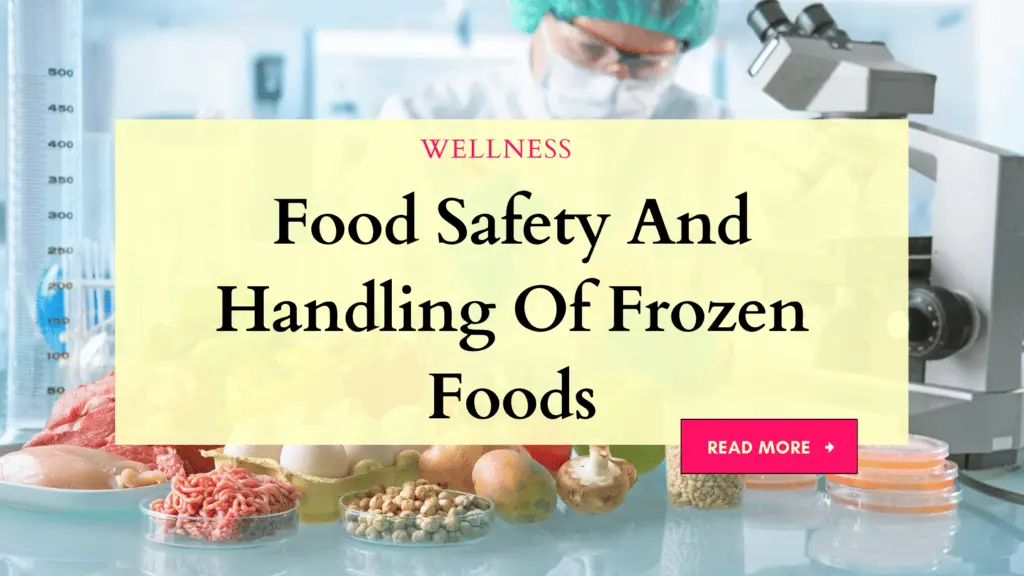As with any business, food manufacturers must abide by Food and Drug Administration standards and guidelines to ensure their products are safe for the consumer. Some frozen food producers have found that there are flaws in parts of their process. To ensure your frozen foods are up to standard, here’s some information about how companies can prevent contaminated foods from getting into the freezer.

-
Save
How Frozen Foods Work
Foods that are frozen freeze quickly and protect food from spoilage. By freezing quickly, foods in the freezer have time to form ice crystals. These crystals help protect the food from harmful bacteria and other organisms. Freezing also locks in flavor and nutrients.
The most important thing to remember when handling frozen foods is to keep them cold. Avoid exposing food to direct sunlight or extreme heat. Protect frozen foods from moisture and pests with proper storage containers.
How Frozen Foods Are Different From Fresh
Fresh foods are those that have been harvested from the ground or cultured in an agricultural setting. Frozen foods, by contrast, are foods that have been frozen after being processed and are generally shelf-stable for several months.
The fact that frozen foods are processed makes them a less desirable option for some people. Because they have been exposed to heat and/or chemicals, frozen foods can contain higher levels of harmful contaminants than fresh food. Additionally, frozen food thawing can release harmful pathogens and toxins into the environment.
Despite these concerns, frozen food is still a popular choice for many people because of its convenience and affordability. Regulations regarding food safety and handling of frozen foods vary by country, so it is important to know the specific guidelines in the place where you live before purchasing or cooking frozen foods.
Testing For The Quality Of Frozen Foods
Food safety and testing of frozen foods are very important. Consumers should be aware of the following food safety precautions when purchasing or eating frozen foods:
-Check the freezer temperature before placing any food in it. Frozen foods should be placed in the freezer at least 0 degrees Fahrenheit. Do not place hot food in the freezer or leave food out for too long to thaw. This can cause bacteria to grow and create unsafe food.
-Wrap your frozen food in plastic wrap and store it in a safe place. Food that has been wrapped and stored properly will not spoil as quickly as food that has not been stored correctly. Freezing does not kill bacteria, so it is important to protect food from contamination while it is being frozen.
-Check the expiration date on your food. Always discard expired food immediately. Food that has passed its expiration date may be contaminated with harmful bacteria that can make you sick.
-Observe proper kitchen hygiene when preparing or eating frozen foods. Hot surfaces such as pans and stovetops should never be used to cook or store frozen foods. Wash your hands thoroughly before touching any food, and use clean cooking surfaces to avoid contaminating your food with harmful bacteria.
.-If you are affected by food poisoning, do not self-treat. Report symptoms to your physician immediately. If symptoms persist and your health is in jeopardy, seek care from a medical professional.
Labels on Frozen Foods
To avoid food poisoning, it is important to follow these tips when buying and preparing frozen foods:
-Always read the label to make sure that the food you are purchasing has been handled and stored properly. Many frozen foods, particularly those that are processed in a factory, can be contaminated with harmful bacteria.
-Avoid eating raw or undercooked meat, poultry, seafood, eggs, or dairy products from frozen food items. These items are particularly risky because they can contain harmful bacteria such as salmonella.
-Freeze fresh produce such as fruits and vegetables as soon as possible so that they will stay safe during storage.
-Store leftovers in an airtight container in the refrigerator.
What kind of food safety and handling procedures are required for frozen foods?
Food safety and handling procedures for frozen foods generally depend on the type of food being stored. For example, meats, poultry, and seafood should be handled similarly to how they are cooked. Fruits and vegetables should be washed thoroughly before being frozen to reduce the chances of food-borne illness. And finally, all frozen food should be placed in leak-proof containers to prevent freezer burn.
Conclusion
Food safety is of the utmost importance, both in the home and in the commercial setting. With food becoming increasingly processed and frozen, it’s important to be able to handle these foods safely and effectively.
-
Save

